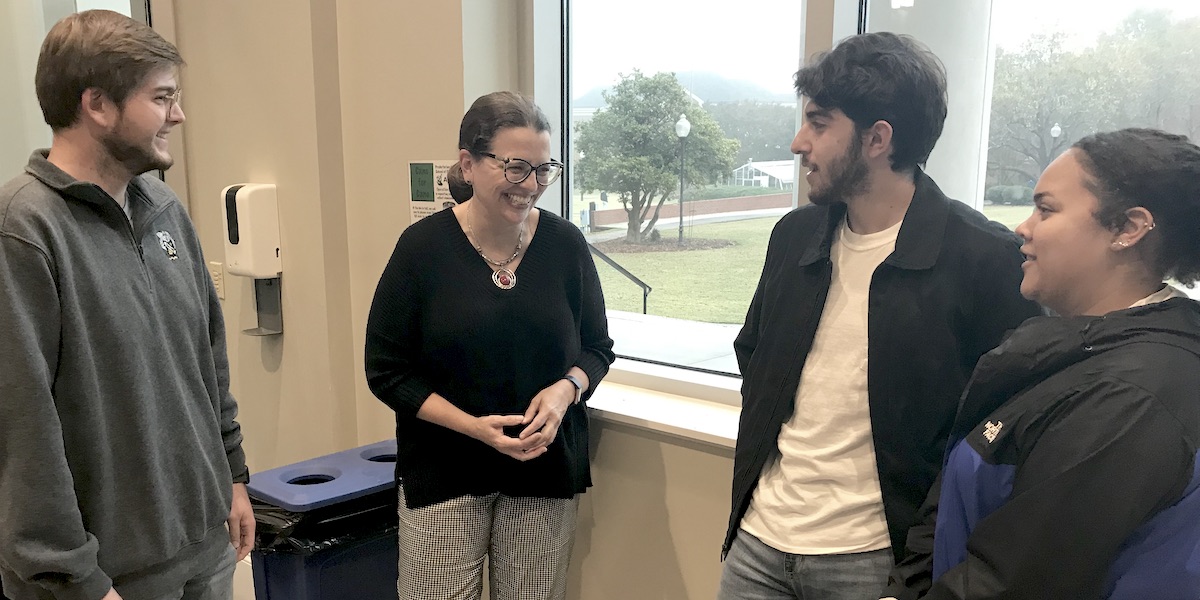Author, historian Robin Morris discusses new book chronicling women’s influence on conservative politics

The Republican Party’s rise to prominence in the South owes a great deal to the behind-the-scenes hard work of women, said author and historian, Dr. Robin Morris.
Morris discussed her new book, Goldwater Girls to Reagan Women: Gender, Georgia and the Growth of the New Right at Presbyterian College Monday in a talk sponsored by the college’s Provost’s Office and its departments of English, political science, history, and women’s and gender studies.
Morris, an associate professor of history at Agnes Scott College, said the growth of the GOP in Georgia – once a Democratic Party stronghold – during the 1960s and 1970s stemmed from the grassroots efforts and political activism of white women like Lee Ague Miller, Beth Callaway, Kathryn Dunaway, and Lee Wysong.
Miller, for example, campaigned in Georgia for GOP nominee Barry Goldwater’s disastrous presidential run against Lyndon B. Johnson. Goldwater did, however, win in several southern states due to the racially-divisive but successful Southern Strategy targeting white southern voters, which Morris argued was developed behind the scenes by members of the Georgia Federation of Republican Women, led by Miller.
“How many of you have heard of Lee Ague Miller?” Morris asked. “Because I would say she’s one of the best political strategists that we’ve had in this nation, and nobody knows about her.”
Morris said Miller used the Southern Strategy years before Richard Nixon used it to win the White House in 1968.
Morris said that while men in Georgia were outwardly supportive of the Democratic Party status quo, their wives were holding Two Party Tea Parties across the state to influence other women who, in turn, convinced men to vote for Republican candidates.
These same women also took on and defeated ratification of the Equal Rights Amendment, which started with bipartisan support but rapidly became an issue only the Democratic Party supported.
The proposed constitutional amendment passed Congress in 1972 but was never ratified by the states. Morris said Republican women in Georgia argued that the ERA was unnecessary because women were already privileged because of technological advances that made their lives easier and freer.
Led by state chair Cathryn Dunaway, the Federation of Republican Women spoke to ministers, baked cakes, delivered bread, and encouraged Georgia lawmakers to vote against the ERA.
Morris said her research revealed significant evidence that women – not men – had more to do with defeating the amendment.
“Too often, people believe that women opposed the ERA because their ministers told them to, or because their husbands told them to,” Morris said. “And what I found was actually the opposite. That it was women meeting with their ministers and taking the information to the ministers to preach about it. It was the women talking to their husbands and telling their husbands why they should care about it.”
Morris said it is a mistake to believe that conservative women don’t think for themselves.
“I want to let you know that these women knew exactly what they were doing,” she said. “They knew exactly why they were fighting it. And they were the ones who are really the catalyst behind stopping the ERA.”
Many of those same women developed and inspired a “family values” platform that united Christianity and politics and led the GOP to become the dominant political force in the South and the most prominent form of Republicanism in the country.
“I’m not going to say that what they did led to Trump,” said Morris, “but what I am going to say is that these everyday acts of women had political meaning.
“In Georgia, and in South Carolina, and in North Carolina in the 1960s, brewing a cup of coffee can constitute a political act, depending on who drank it and with whom. Hundreds of women found their way to the Republican Party over a cup of coffee in their neighbor’s living room.”
